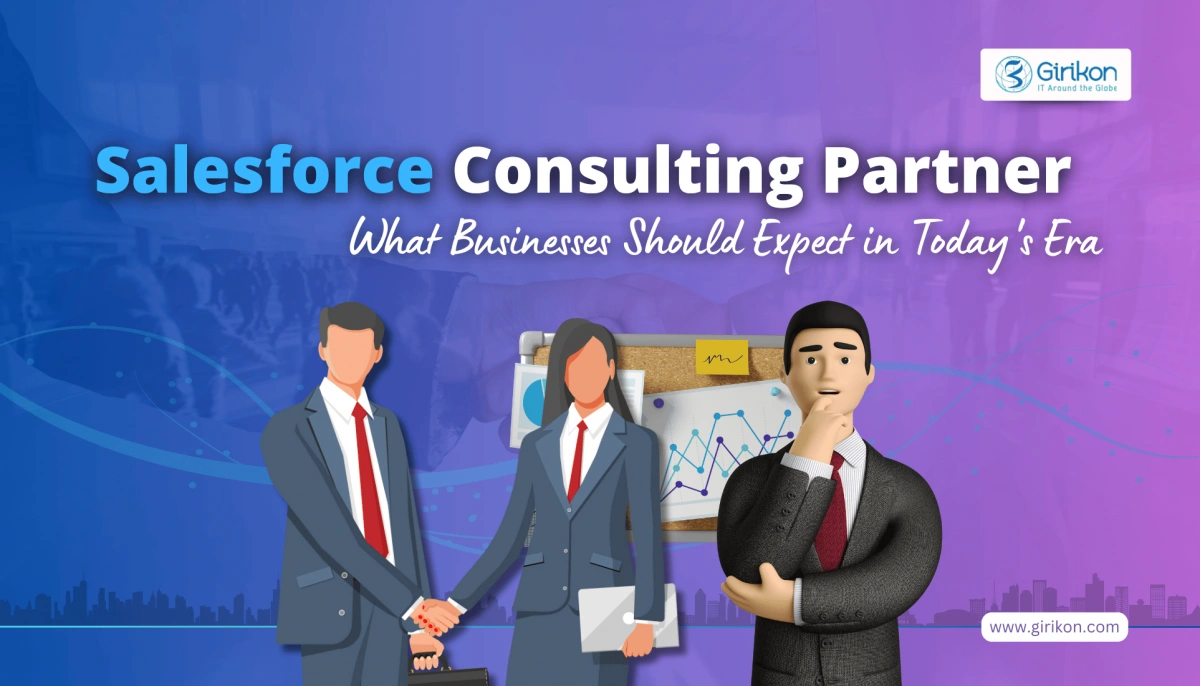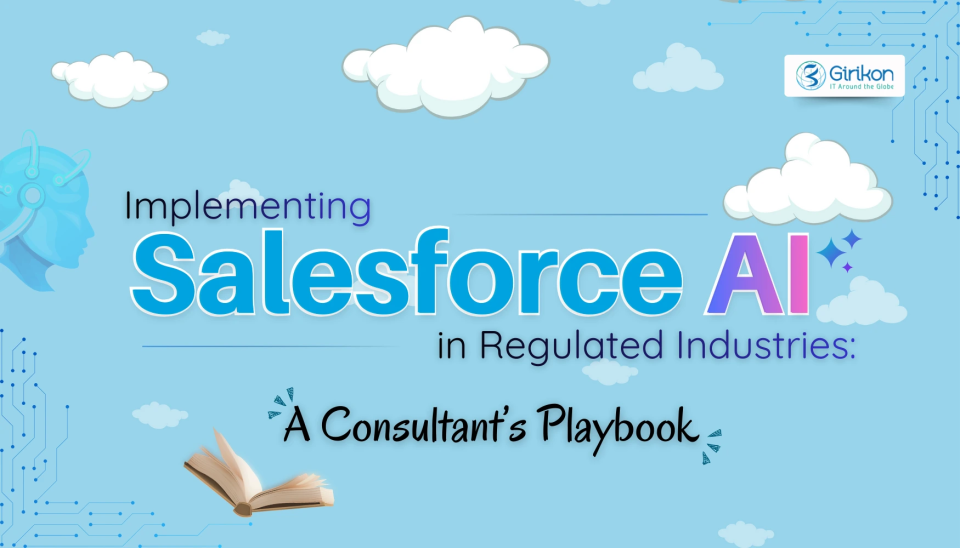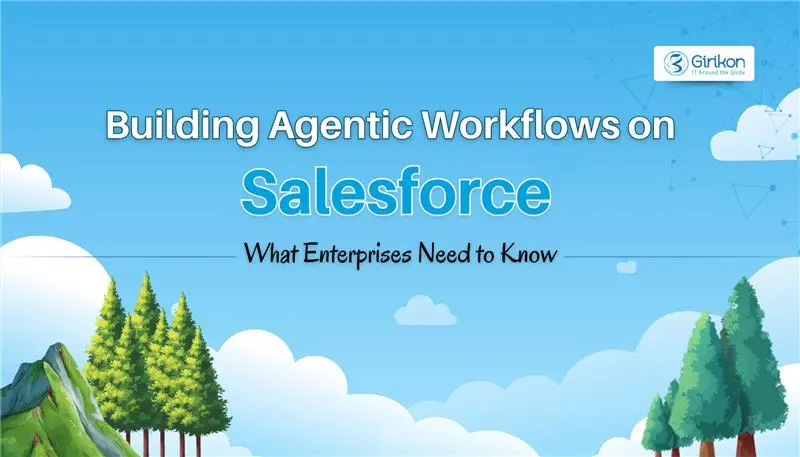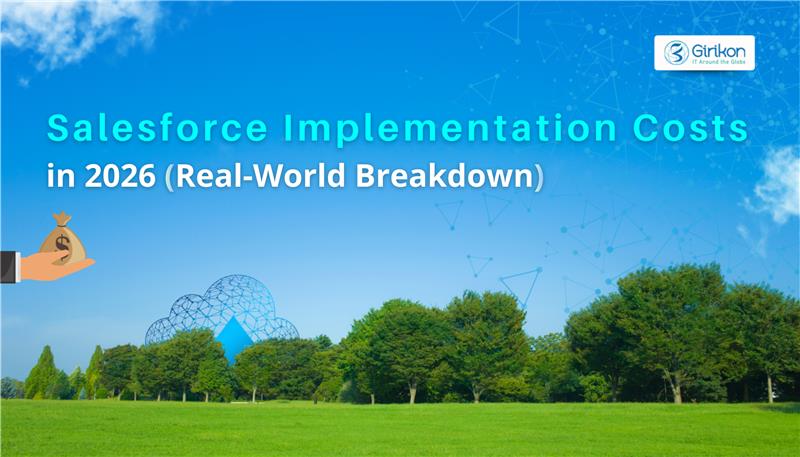Our Blogs
For enterprises across the globe, Salesforce isn’t just a CRM, it’s the mainstay of customer engagement and data-driven decision-making. To harness the full potential of Salesforce, organizations must avail best Salesforce Consulting Services from a reputed service provider. Over the years, the business environment has evolved significantly with complex need for integrations and AI transforming the way businesses conduct themselves. Consequently, the role of a salesforce consulting partner has also evolved significantly.

In fact, businesses look for partners who aren’t just adept at implementing the salesforce platform, they expect them to serve as long-term advisors, enablers of transformation and drivers of innovation. Let’s discuss through this article how salesforce consulting partners can assist businesses by bringing them desired value.
How is the Business and Technology Landscape Evolving?
The innovative Salesforce platform has witnessed significant transformation from being a sales automation tool to an ecosystem comprising of several cloud and AI powered platforms including but not limited to Sales cloud, service cloud, Slack, Einstein GPT and more. Besides significant growth, the complexity is complementary.
Consequently, businesses are under constant pressure to provide consistent experiences. This requires more than just technical implementation skills and calls for process re-engineering, alignment and ongoing optimization. Salesforce consulting partners have evolved beyond being just implementers. Rather they have transitioned to become true business enablers, expected to guide organizations through change, maximize ROI, while ensuring their Salesforce investments remain future-ready.
Why Engaging the Services of a Consulting Partner Matters?
Engaging the services of partner is no longer good to have, it’s a must have for businesses to sustain in this digital era:
A Strategy Oriented Approach
The role of consulting partners has evolved way beyond simply dashboard configuration or creating workflows. Leading consulting partners start with a clear focus on outcomes. By understanding your growth objectives, finding gaps in customer experience, and assessing how all the functions connect across your organization. Before writing a line of code, they ask the questions to align technology with strategy. By mapping the capabilities of the platform to your business priorities, they ensure the platform becomes a promoter of measurable results rather than an underutilized tool.
Industry Expertise
While Salesforce provides a massive ecosystem of tools, every business has exclusive needs. For instance, the challenges faced by a finance company may differ largely from that of a healthcare services provider. Modern consulting partners set themselves apart through deep industry expertise, fetching pre-built accelerators, compliance knowledge, and verified playbooks tailor-made to specific sectors. When choosing a partner, it’s crucial to assess client references within your industry, as a partner with sector-specific experience can provide quicker and impactful results.
Multi-Cloud Expertise
Today, most customers extend beyond just Service and Sales Cloud. They have started investing across the broader ecosystem including numerous cloud platforms. While this multi-cloud environment offers immense power, it also brings complexity that requires an integration-first and cross-platform expertise. The right partner will merge these clouds into a seamless experience. This enables smooth data flow across platforms and suggests the right rollout sequence to curtail disruption. Without proven success, a partner may find it difficult to future-proof your Salesforce investment.
A Data and AI Lens
Salesforce thrives on data, but with improvements in AI, the way organizations harness it is gradually transforming. Tools such as Einstein AI, Einstein GPT and more enable businesses to automate insights, offer tailored interactions, and anticipate with greater precision. Modern partners go beyond creating dashboards. Rather, they help ensure data hygiene, governance and dependable for decision-making, design AI-driven workflows that scale, and apply predictive insights to enhance customer experiences and sales forecasting. The best partners place data not as an operational requirement but as a commanding competitive edge.
Agile Implementation
Most Salesforce implementations trip not due to technology, but because of people who either show resistance to change or adoption. The best partners understand this and take a people-first approach. They apply agile delivery methods, flouting large projects into small manageable phases that deliver continuous and early value. Alongside this, they emphasize change management through structured training, adoption strategies and clear communication, that help users embrace Salesforce. Strong frameworks for control are placed to guide future enhancements and long-term maintenance. Most importantly, a good partner remains engaged beyond implementation, actively supporting adoption rather than delivering the technology and walking away.
Long-Term Partnership
Salesforce releases three updates in a year, making it crucial for businesses to seek guidance on a regular basis to stay ahead. The most effective partners act as long-term associates rather than one-time implementers. They offer planning of roadmap to align Salesforce with future growth, constant optimization to take full advantage of support services or managed solutions to fulfill ongoing needs. When assessing a partner, prioritize those who are dedicated to your long-term success instead of short-term implementation fees.
Security and Compliance
Since customer data lies at the heart of Salesforce, security and compliance must be a priority rather than an extra. The right Salesforce consulting partners design secure designs tailored to regulatory and compliance requirements, hold regular system health checks, and stay current with growing compliance standards in an industry. In an era of increasing data breaches and stringent regulations, trust has become non-accessible. Partners who insert security into every stage of delivery are the ones partnering with.
Clear Value
Businesses today claim clear ROI from their consulting partner. It’s no longer enough to deliver a functioning system. Partners are expected to reveal how the platform directly drives revenue growth, operational efficiency, or enhanced customer satisfaction. The best partners establish success metrics and track them through the engagement, using dashboards to keep track of adoption, sales performance, response times, and marketing ROI. This focus on assessable outcomes ensures the platform delivers tangible business value.
Final Words
Choosing a consulting partner in today’s era of digital transformation isn’t all about having the right technical skills. It’s about bringing aboard a partner who can combine strategic vision, industry expertise, and a pledge to long-term success. Irrespective of the industry a business belongs to a Salesforce implementation Consultant take a business to new heights.

 +1-480-241-8198
+1-480-241-8198 +44-7428758945
+44-7428758945 +61-1300-332-888
+61-1300-332-888 +91 9811400594
+91 9811400594


















